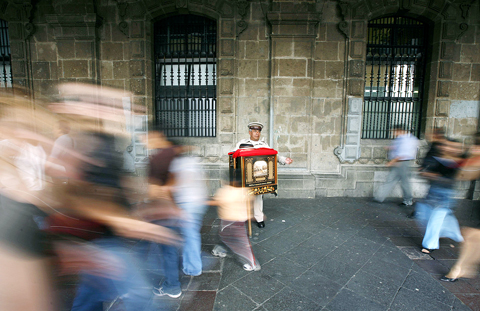Immigration authorities are flying illegal immigrants deep into their native Mexico from Southern Arizona to discourage dangerous crossings in desert heat in excess of 38ºC.
The twice-daily flights from Tucson to Mexico City are intended to keep immigrants away from border towns where they would likely run into smugglers who want to sneak them back into the US
“This is where the probability of losing their lives can really increase. We offer that opportunity for them to get out of that cycle,” John Torres, a special adviser to the assistant secretary of US Immigration and Customs Enforcement, said on Monday in Tucson, Arizona.

PHOTO: REUTERS
The US Department of Homeland Security flights began Saturday for the sixth straight summer and will end on Sept. 28.
Tucson is the only spot in the country where the flights depart and Arizona is the busiest illegal entry point into the US.
Since 2004, more than 82,000 Mexicans have been returned as part of the repatriation program. The number, however, represents just a small portion of illegal immigrants into the country.
Hundreds of people die crossing the border each year from heat exposure, vehicle and train accidents, fatigue, banditry and other causes.
Smugglers, who can earn an average of US$1,500 for each customer, use remote and dangerous migration routes where enforcement is weaker, a tactic that contributes to the deaths.
The repatriation program is for Mexicans who cross the border illegally, volunteer to take the flights home and don’t have criminal records.
Participants include people who are vulnerable to the heat because of their age or physical condition. The flights carry an average of 150 people each and aren’t available to people from other countries.
In Mexico City, participants are bused to their hometowns, typically in central and southern Mexico.
The Mexican government picks up some costs of the program, while the US pays US$6 million under a contract with carrier Miami Air.

Kehinde Sanni spends his days smoothing out dents and repainting scratched bumpers in a modest autobody shop in Lagos. He has never left Nigeria, yet he speaks glowingly of Burkina Faso military leader Ibrahim Traore. “Nigeria needs someone like Ibrahim Traore of Burkina Faso. He is doing well for his country,” Sanni said. His admiration is shaped by a steady stream of viral videos, memes and social media posts — many misleading or outright false — portraying Traore as a fearless reformer who defied Western powers and reclaimed his country’s dignity. The Burkinabe strongman swept into power following a coup in September 2022

A new online voting system aimed at boosting turnout among the Philippines’ millions of overseas workers ahead of Monday’s mid-term elections has been marked by confusion and fears of disenfranchisement. Thousands of overseas Filipino workers have already cast their ballots in the race dominated by a bitter feud between President Ferdinand Marcos Jr and his impeached vice president, Sara Duterte. While official turnout figures are not yet publicly available, data from the Philippine Commission on Elections (COMELEC) showed that at least 134,000 of the 1.22 million registered overseas voters have signed up for the new online system, which opened on April 13. However,

‘FRAGMENTING’: British politics have for a long time been dominated by the Labor Party and the Tories, but polls suggest that Reform now poses a significant challenge Hard-right upstarts Reform UK snatched a parliamentary seat from British Prime Minister Keir Starmer’s Labor Party yesterday in local elections that dealt a blow to the UK’s two establishment parties. Reform, led by anti-immigrant firebrand Nigel Farage, won the by-election in Runcorn and Helsby in northwest England by just six votes, as it picked up gains in other localities, including one mayoralty. The group’s strong showing continues momentum it built up at last year’s general election and appears to confirm a trend that the UK is entering an era of multi-party politics. “For the movement, for the party it’s a very, very big

ENTERTAINMENT: Rio officials have a history of organizing massive concerts on Copacabana Beach, with Madonna’s show drawing about 1.6 million fans last year Lady Gaga on Saturday night gave a free concert in front of 2 million fans who poured onto Copacabana Beach in Rio de Janeiro for the biggest show of her career. “Tonight, we’re making history... Thank you for making history with me,” Lady Gaga told a screaming crowd. The Mother Monster, as she is known, started the show at about 10:10pm local time with her 2011 song Bloody Mary. Cries of joy rose from the tightly packed fans who sang and danced shoulder-to-shoulder on the vast stretch of sand. Concert organizers said 2.1 million people attended the show. Lady Gaga